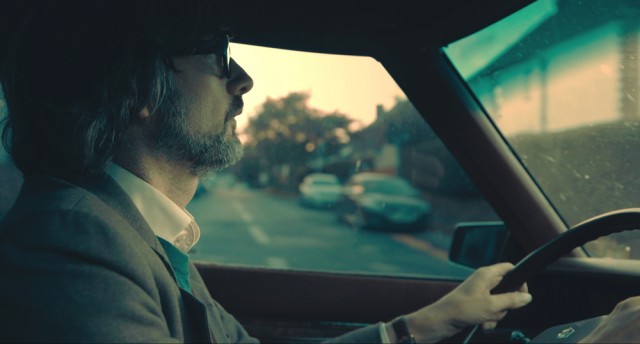
Jarvis Cocker takes a ride through his hometown of Sheffield as he prepares for Pulp farewell concert
PULP: A FILM ABOUT LIFE, DEATH & SUPERMARKETS (Florian Habicht, 2013)
SOUND + VISION
Film Society of Lincoln Center, Walter Reade Theater
144 West 65th St. between Broadway & Amsterdam Ave.
Wednesday, August 6, 8:30
212-875-5600
www.filmlinc.com
ROOFTOP FILMS
Industry City roof and courtyard
220 36th St., Sunset Park
Thursday, August 7, live music 8:30, film screening 9:00
www.rooftopfilms.com
www.pulpthefilm.com
 Florian Habicht’s Pulp: A Film About Life, Death & Supermarkets is a brilliant inside look at the long-lasting relationship between a band and its hometown. In December 2012, British alternative band Pulp returned to the place of its birth, the rugged, working-class city of Sheffield in the north of England, for what was being billed as its last-ever concert on dry land. Pulp frontman Jarvis Cocker hooked up with Habicht (Love Story, Woodenhead), conceiving a project in which the time and place, along with the fans, would be just as important as the band and its music, if not more so. In the nonchronological film, Habicht cuts between archival footage of Pulp, clips from the final concert, interviews on the street with old and young fans, and brief chats with Pulp tour manager Liam Rippon and the other band members: guitarist Mark Webber, keyboardist Candida Doyle, bassist Steve Mackey, and drummer Nick Banks, who are pretty much taking it all in stride. But at the center of it all is the soft-spoken, enigmatic Cocker, who founded Pulp back in 1978 when he was fifteen years old.
Florian Habicht’s Pulp: A Film About Life, Death & Supermarkets is a brilliant inside look at the long-lasting relationship between a band and its hometown. In December 2012, British alternative band Pulp returned to the place of its birth, the rugged, working-class city of Sheffield in the north of England, for what was being billed as its last-ever concert on dry land. Pulp frontman Jarvis Cocker hooked up with Habicht (Love Story, Woodenhead), conceiving a project in which the time and place, along with the fans, would be just as important as the band and its music, if not more so. In the nonchronological film, Habicht cuts between archival footage of Pulp, clips from the final concert, interviews on the street with old and young fans, and brief chats with Pulp tour manager Liam Rippon and the other band members: guitarist Mark Webber, keyboardist Candida Doyle, bassist Steve Mackey, and drummer Nick Banks, who are pretty much taking it all in stride. But at the center of it all is the soft-spoken, enigmatic Cocker, who founded Pulp back in 1978 when he was fifteen years old.
Habicht shows Cocker biking and driving through Sheffield, discussing his first job working for a fishmonger in a mall, and, most thrillingly, fixing a flat tire on his less-than-fancy car. The theme song of the documentary is Pulp’s “Common People,” in which a woman tells Cocker, “I want to live like common people / I want to do whatever common people do / I want to sleep with common people / I want to sleep with common people like you.” Is it possible for a rock star to be “common people”? It doesn’t really matter as Cocker reestablishes his connection to Sheffield. “We stopped playing in 2001 or 2002 or whatever it was, and I did feel that the way it finished was kind of a bit, I don’t know, not right,” he says in the film. “It didn’t feel like a good ending. . . . So I know that tidying up isn’t the greatest rock-and-roll motivation, but I did want to kind of tidy things up and give the story a happy ending.” It is all very happy indeed, as Habicht also delves into such Pulp favorites as “This Is Hardcore” and “Help the Aged” as well as “Disco 2000,” “Underwear,” and “Sheffield: Sex City.” The band, which released seven studio albums during its career, from 1983’s It through 2001’s We Love Life, has no arguments or complaints, just positive attitudes that make Pulp a thoroughly exhilarating experience. The film opens in November but is having two special screenings this week, first as the closing-night selection of the “Sound + Vision” festival at Lincoln Center on August 6, followed by a Q&A with Habicht, then the next night at Industry City in Sunset Park as part of the annual summer Rooftop Films series, preceded by a live set by Mondo and followed by a Q&A with Cocker and Habicht and a Pulp karaoke contest that the two men will judge at the after-party.